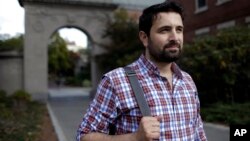The largest U.S. physician group Wednesday urged President Donald Trump’s administration to protect international physicians and seriously ill patients from an executive order that limits immigration from seven Muslim-majority countries.
In a letter addressed to U.S. Secretary of Homeland Security John Kelly, the American Medical Association warned that the order created barriers to health care by preventing international physicians from getting back into the country or obtaining visas. It also wrote that the order should not impact patients who need timely medical care in the United States.
“The AMA is concerned that this executive order is negatively impacting patient access to care and creating unintended consequences for our nation’s health care system,” the group said in a public letter posted on its web site. “It is vitally important that this process not impact patient access to timely medical treatment.”
Four-month hold
Last Friday, Trump put a four-month hold on allowing refugees into the United States and temporarily barred travelers from Syria and six other Muslim-majority countries, saying the moves would help protect Americans from terrorist attacks.
Reuters reported earlier this week that Trump's order wreaked panic and uncertainty among refugees in the U.S. pipeline with urgent medical needs, some of whom had prioritized applications. The order could mean as many as 800 people needing medical entry will be denied entry, said Karen Monken of HIAS, a Maryland-based refugee assistance organization formerly known as Hebrew Immigrant Aid Society.
The Department of Homeland Security said in a statement the executive order “ensures a more rigorous vetting process.”
“The Department of Homeland Security will continue to enforce all of President Trump’s executive orders in a manner that ensures the safety and security of the American people,” the agency said.
International doctors hurt, too
The letter also pointed to the importance of international medical graduates, who comprise one out of every four physicians practicing in the United States. They are more likely to work in underserved and poor communities, the group wrote, and fill training positions that face workforce shortages.
Other physician groups, including the Association of American Medical Colleges and American College of Physicians, expressed concern in separate statements earlier this week that the order would create further barriers to care.





